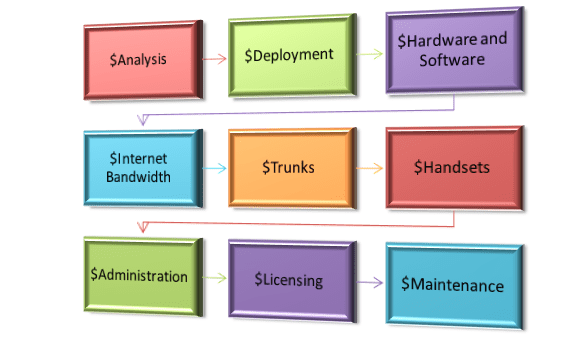
Cost is a major factor that drives virtually every decision a business owner makes. Not only is it important to look at the up-front costs of something, the total cost of ownership comes into play, too. For some companies, it might be worthwhile to lay out more capital in the short-term, if it parlays into long-term savings. For others, they might not use a product or service long enough to justify the initial set up costs. This is true of a hosted phone system, just like it is for anything else.
It may sound strange to talk about the total cost of ownership with an off-site phone system, since the user doesn’t actually “own” anything other than handsets. In reality, that’s what makes the TCO for a hosted phone system lower, in general, than for an on-site system- there’s no equipment to own. That doesn’t always make a hosted phone system less expensive in every case, but it almost certainly will be as soon as your business requirements grow beyond 3-4 extensions and a single location.
A lot of small and medium-sized businesses are turned off to owning their own system, because the initial cost of the equipment they need to do so can be pretty high. That’s just the tip of the iceberg, however – a lot of businesses look at that as a one-time cost, when it’s really anything but. Technology ages very rapidly, which means that it’s virtually guaranteed that a company’s phone system will require an overhaul at some point, and all of that equipment will have to be upgraded or replaced. This is not an issue with a hosted phone system, since the responsibility of keeping equipment and software up-to-date falls on the hosted PBX service provider, not the user.
That said, it’s tempting to look at an initial set up cost of several thousand dollars for an on-site phone system versus a low monthly fee for a hosted one, and decide the hosted one is cheaper. The trouble is, that’s not always the case. For some companies, that low monthly fee is going to be much higher than what they would pay to maintain their own system, which will eat into their savings. PBX vendors are likely to charge users hefty licensing fees for each software upgrade, each additional seat, increased capacity or new feature. This will vary based on the actual system in question, but unless business requirements are set in stone for years, this change is likely to occur and repeat sooner than anticipated by many buyers.
Figuring out the TCO for any phone system is requires good understanding of your cost structure.
- First, you must assemble your business requirements. This means surveying the number of phone users and the type of communications each of them is going to need. This will determine number of extensions, types of hardware or software handsets and feature set needed for your phone system.
- Most modern phone systems are based on VoIP technology which may place some bandwidth and other requirements on your network infrastructure. Prior to determining whether your network infrastructure meets these requirements, it has to be evaluated. Any sort of planning bears certain labor costs.
- If in fact your infrastructure needs an upgrade, the cost of network upgrade will be added to the calculation. You must bear in mind, however, that some type of VoIP network upgrade is often needed for both: premise-based and hosted phone systems.
- The cost of a communications systems vary. Other than direct cost of premise-based phone system equipment, software and licensing you may also consider the cost of financing (unless, of course you plan on paying for the system upfront).
- Next, you will need to add the cost of endpoint devices which may come in form of software, hardware or both. These will be almost certainly allocated to your individual users.
- Cost of deployment (installation, training of users and administrators, lost productivity due to learning how to operate your new system). Some PBX systems will integrate with your business’s active directory or LDAP. Those costs while not directly impacting your cash flow still exist and require consideration.
- Software and Hardware maintenance costs of a premise-based system will counter licensing and monthly service fees of a hosted PBX service. Software and maintenance contracts on average will amount to 15% of the cost of your equipment annually. Administration cost of any type of phone system typically requires allocating competent IT staff or hiring a consultant. These may also include the cost of insuring your premise-based system and/or handsets.
- Cost of phone calls and telephony company service with a premise based PBX are typically weighed against recurring cost of a hosted pbx service and cost of Internet bandwidth allocated to your VoIP calls. Many hosted PBX service providers offer options of an “all-inclusive” flat rate plans that cover local and long distance calls for each extension or usage-based calls that typically involve lower base extension cost. Cost of bandwidth may vary drastically depending on geographic location of your business. With most premise-based telephone systems, there is typically a cost of voice trunks such as PRI (Prime Rate ISDN), POTS (Plain Old Telephone Service) or VoIP (Voice over IP). These relate to maximum number of concurrent outbound telephone calls your phone system can support. Few hosted PBX service providers also choose to charge for VoIP trunks.
In most cases, a hosted phone system will be worth it for the sake of convenience and peace of mind alone.